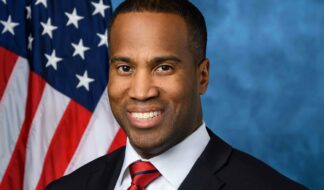A landmark legal decision for transgender rights was issued last week. A unanimous three-judge panel of the federal Sixth Circuit Court of Appeals — covering Michigan, Kentucky, Ohio and Tennessee — ruled that Michigan RG & GR Harris Funeral Homes violated federal civil rights laws when they fired Aimee Stephens for a being a transgender woman.
Aimee Stephens worked for Harris Funeral homes for six years as funeral director, receiving excellent performance evaluations. Having to conceal her gender identity at work during that time, she informed her employer that she was a transgender woman and would begin presenting as her authentic female self at work. The funeral home immediately terminated her.
Aimee contacted the ACLU of Michigan, and we advised her to file a complaint with the federal Equal Employment Opportunity Commission (EEOC) — the federal agency that investigates employment discrimination complaints. Under the theory of sex discrimination, the EEOC found that Harris Funeral Homes illegally discriminated against Aimee because she did not conform to gender stereotypes regarding how a person assigned male at birth should look and act. When Harris refused to agree with the findings and terms of settlement, the EEOC filed a lawsuit in federal district court in Detroit for the Eastern District of Michigan.
U.S. District Judge Sean Cox held that although the funeral home may have discriminated against Aimee, the owner's religious beliefs that being transgender was against God's plan, exempted him from having to comply with Title VII, federal law that prohibits sex discrimination.
The case was appealed to the Sixth Circuit Court of Appeals and the ACLU of Michigan joined the lawsuit on behalf of Aimee Stephens. We asked to join the case because the U.S. Department of Justice, under President Trump, interprets sex discrimination laws such that LGBTQ people are not protected by these laws. We wanted to ensure Aimee's legal interests were adequately raised and addressed. In Oct. 2017, the ACLU argued the appeals case which resulted in last week's decision.
Although the Sixth Circuit has favorably addressed the issue of transgender employees being protected from discrimination under Title VII in previous cases, this decision makes it explicitly clear that discrimination against transgender employees is gender stereotyping. In its written opinion the court stated, "Discrimination because of an individual's transgender status is always based on gender stereotypes: the stereotype that individuals will conform their appearance and their behavior – whether their dress, the name they use or other ways they present themselves – to the sex assigned them at birth."
Equally as significant, this is the first time that a federal appeals court has ruled that an employer's religious beliefs do not exempt him from civil rights laws that prohibit discrimination against transgender employees.
While employers may have sincerely held religious beliefs, the government has a compelling interest in eradicating discrimination in the workplace. This holding is especially important because we have seen increased efforts by employers and business owners citing their religious beliefs to justify discrimination against LGBTQ people. The most high-profile case was argued before the U.S. Supreme Court in December, where a bakery owner refused to bake a cake for a same-sex couple, citing his religious beliefs concerning same-sex marriage. That decision will be issued sometime in June.
The funeral home is entitled to ask for a rehearing by the full panel of Sixth Circuit Court of Appeals judges or request that the U.S Supreme Court take up the case. But for now this seminal decision stands. Transgender people are protected from discrimination under federal law, and employers can no longer use their religious beliefs to justify discrimination against trans people. The Sixth Circuit got it right and Aimee Stephens will at last have the justice that she deserves.
Unanimous Vote in Favor of Michigan Transgender Woman is Groundbreaking










